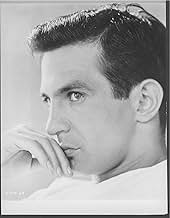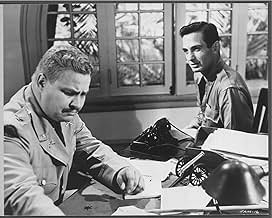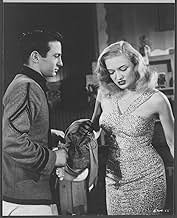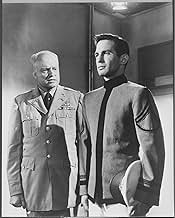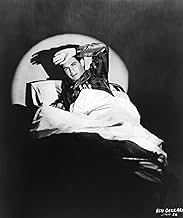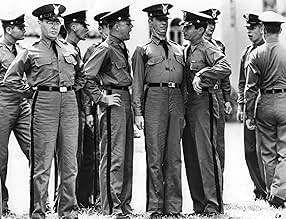IMDb RATING
6.9/10
1.4K
YOUR RATING
Students faced with an ethical dilemma about the dehumanization associated with the tradition of hazing, at a military college in the Southern United States, take matters in their own hands.Students faced with an ethical dilemma about the dehumanization associated with the tradition of hazing, at a military college in the Southern United States, take matters in their own hands.Students faced with an ethical dilemma about the dehumanization associated with the tradition of hazing, at a military college in the Southern United States, take matters in their own hands.
Peter Mark Richman
- Cadet Colonel Corger
- (as Mark Richman)
Vergel Cook
- Jo
- (uncredited)
Featured reviews
"The Strange One" is a very good film but its current score on IMDB would seem to indicate it's an average film and nothing more. Well, as for me, I loved it as the story was very compelling and it was a nice chance to see some very good actors before they became famous (such as Ben Gazzara, James Olson and Mark Richmond).
The story is set in some fictional southern military college...similar to VMI or The Citadel. The story mostly centers around Gazzara's character, an upper classman who is a sociopath who loves mistreating his underclassmen. He also is a master manipulator and all around jerk....and his latest 'prank; results in a cadet being badly beaten and framed for getting drunk....when the young man in question did nothing wrong and the alcohol was forced down his throat.
During course of the story you learn tow important things. First, he was caught tormenting underclassmen before. Second, his fellow classmates hated him...and it took this incident to bring this to the surface. And, in the end, the students come up with a great plan to deal with this jerk.
Well written, exciting and well worth your time. I found this sleeper on YouTube and hope you also give it a try.
The story is set in some fictional southern military college...similar to VMI or The Citadel. The story mostly centers around Gazzara's character, an upper classman who is a sociopath who loves mistreating his underclassmen. He also is a master manipulator and all around jerk....and his latest 'prank; results in a cadet being badly beaten and framed for getting drunk....when the young man in question did nothing wrong and the alcohol was forced down his throat.
During course of the story you learn tow important things. First, he was caught tormenting underclassmen before. Second, his fellow classmates hated him...and it took this incident to bring this to the surface. And, in the end, the students come up with a great plan to deal with this jerk.
Well written, exciting and well worth your time. I found this sleeper on YouTube and hope you also give it a try.
Jack Garfein made "The Strange One" in 1957. It was adapted by Calder Willingham from first his novel and then his play "End as a Man". Actually the title "The Strange One" doesn't really do it justice; a better, if somewhat declamatory, title might have been 'The Evil One' since its central protagonist, Jocko De Paris, is one of the most sadistic and warped anti-heroes in all of fiction. The setting is a military academy in the Deep South and Jocko is cock of the walk. He rules with a combination of charm and viciousness but it all goes belly-up for him when he targets a young cadet and his father, who happens to be an officer there. His scheme involves four other cadets whose fear of him he's counting on. It's a melodramatic scenario that culminates in a bravura, sustained passage of mounting hysteria but it's brilliant in the way that the best of Tennessee Williams or William Inge are brilliant. Willingham's dialogue has the ring of poetry to it and Garfein, whose first film this was, (he's only made one since), directs it superbly.
Of course, it would have been nothing were it not for its cast, many of whom were totally unknown at the time. Ben Gazzara may already have been a star on the New York stage, (he was Brick in "Cat on a Hot Tin Roof"), but was an unknown quantity in the movies, (it was also his first film). His performance as Jocko should have made him a much bigger star than he ever became and it remains a career-best performance. Those who fall under his spell include Pat Hingle, James Olson, Arthur Storch and George Peppard. They are all terrific; Peppard, also making his screen debut, shows real promise and Hingle in outstanding.
There's also one overtly gay character, (though the whole picture is suffused with homo-eroticism), a cadet who fancies himself a writer and who is obviously in love with Jocko. He's played by Paul Richards as a grotesque and flamboyant queen, part Truman Capote and part Gore Vidal. In any other film this character would be offensively out of place but here he's just one more poisonous plant in this insidious hothouse. The film wasn't successful and is almost impossible to see now, at least here in the UK but it's a masterpiece and one of the best American films of the fifties. Essential.
Of course, it would have been nothing were it not for its cast, many of whom were totally unknown at the time. Ben Gazzara may already have been a star on the New York stage, (he was Brick in "Cat on a Hot Tin Roof"), but was an unknown quantity in the movies, (it was also his first film). His performance as Jocko should have made him a much bigger star than he ever became and it remains a career-best performance. Those who fall under his spell include Pat Hingle, James Olson, Arthur Storch and George Peppard. They are all terrific; Peppard, also making his screen debut, shows real promise and Hingle in outstanding.
There's also one overtly gay character, (though the whole picture is suffused with homo-eroticism), a cadet who fancies himself a writer and who is obviously in love with Jocko. He's played by Paul Richards as a grotesque and flamboyant queen, part Truman Capote and part Gore Vidal. In any other film this character would be offensively out of place but here he's just one more poisonous plant in this insidious hothouse. The film wasn't successful and is almost impossible to see now, at least here in the UK but it's a masterpiece and one of the best American films of the fifties. Essential.
Originally advertised as the first picture filmed entirely by a cast and technicians from the Actor's Studio, this tale of power play amongst the cadets of a Southern military academy, only comes alive when it features the material that the Production Code of the 1950's demanded be cut.
Based on the autobiographical novel and play End as a Man by Calder Willingham, director Jack Garfein uses the music of Kenyon Hopkins noticably in the scenes between Ben Gazzara as an upperclass man and Paul E Richards as a presumably gay cadet Gazzara nicknames Cockroach, who wears a shower cap when the other cadets don't. Richards is a "creative writer" who names the Gazzara character in his novel "nightboy". Their best scene together is where Richards reads to Gazzara, who plays with his sword! Clearly Gazzara is not adverse to Richard's attention, and their farewell handshake is more a sensual than manly experience. Gazzara's relationship with Richards is also echoed in his friendship with football jock James Olson, where Gazzara reacts to being casually touched. I also like idea of Gazzara's cigarette holder, though his kissing his own wrist at one point is a little too self-consciously Method.
But whilst it is interesting to observe these subversive (for the period) elements, the narrative ultimately disappoints in the treatment of Gazzara as the academy's resident sadist. The Actors Studio adaptation needs to create an ensemble, as opposed to allowing Gazzara to star, which dissipates the tension and reduces his threat. Whilst it may be more psychologically truthful for him to underplay his psychotic nature, with the addition of Freudian insight which makes him more intellectual than physically violent, this doesn't help the drama, which is even more obvious when the far more satisfying climax uses mob intimidation and a physical act of revenge.
The worst of the Actors Studio excess is in the presentation of victim Arthur Storch who is said to be schizophrenic and thus an easy target. Storch has coke-bottle spectacles, buck teeth, cartoon at attention posture, ambition to become a priest, is a mommy's boy, afraid of women, and anti-alcoholic. Gazzara's interest in Storch is inexplicable, even if he does hold him down while Olson spanks him with a broom, but as a good part of the film has us trapped in one room (the stage origins show here) while we're supposed to observe how bad Gazzara is, proceedings crawl into tedium. Or perhaps this kind of s/m power play just doesn't hold that much interest for me. The academy rooms have cell-like iron gates in front of the doors, and even though they aren't locked, the film opens with a guard hitting each as he passes, doing a role call.
Watch for Gazzara's sci-fi buggy car, which has room in the back for a passenger.
Based on the autobiographical novel and play End as a Man by Calder Willingham, director Jack Garfein uses the music of Kenyon Hopkins noticably in the scenes between Ben Gazzara as an upperclass man and Paul E Richards as a presumably gay cadet Gazzara nicknames Cockroach, who wears a shower cap when the other cadets don't. Richards is a "creative writer" who names the Gazzara character in his novel "nightboy". Their best scene together is where Richards reads to Gazzara, who plays with his sword! Clearly Gazzara is not adverse to Richard's attention, and their farewell handshake is more a sensual than manly experience. Gazzara's relationship with Richards is also echoed in his friendship with football jock James Olson, where Gazzara reacts to being casually touched. I also like idea of Gazzara's cigarette holder, though his kissing his own wrist at one point is a little too self-consciously Method.
But whilst it is interesting to observe these subversive (for the period) elements, the narrative ultimately disappoints in the treatment of Gazzara as the academy's resident sadist. The Actors Studio adaptation needs to create an ensemble, as opposed to allowing Gazzara to star, which dissipates the tension and reduces his threat. Whilst it may be more psychologically truthful for him to underplay his psychotic nature, with the addition of Freudian insight which makes him more intellectual than physically violent, this doesn't help the drama, which is even more obvious when the far more satisfying climax uses mob intimidation and a physical act of revenge.
The worst of the Actors Studio excess is in the presentation of victim Arthur Storch who is said to be schizophrenic and thus an easy target. Storch has coke-bottle spectacles, buck teeth, cartoon at attention posture, ambition to become a priest, is a mommy's boy, afraid of women, and anti-alcoholic. Gazzara's interest in Storch is inexplicable, even if he does hold him down while Olson spanks him with a broom, but as a good part of the film has us trapped in one room (the stage origins show here) while we're supposed to observe how bad Gazzara is, proceedings crawl into tedium. Or perhaps this kind of s/m power play just doesn't hold that much interest for me. The academy rooms have cell-like iron gates in front of the doors, and even though they aren't locked, the film opens with a guard hitting each as he passes, doing a role call.
Watch for Gazzara's sci-fi buggy car, which has room in the back for a passenger.
An upper class man at a rigid southern military academy abuses his power in a highly conceived plot in order to orchestrate an expulsion of another cadet. We're left to wonder why he's motivated to do so, and the acting and scenes in this part of the film do seem to be too staged, but the film makes for riveting viewing as in its portrayal of the overall ambiance of the the academy, a strange hierarchy with bizarre scenes of interaction between the lower and upper class men. And a final military brand of cadet justice that unites the two classes gets born out of the incident, and reveals a lot, and ends in a chilling finale with superior night scenes.
Back in the 1950s the movie Production Code in the U.S. censored topics and dialogue that it considered morally offensive or too provocative for a general audience. To get around this, Hollywood disguised the plot and dialogue in some films. The disguise allowed the presentation of underlying subversive themes, but in veiled form. "The Strange One" is a film with a provocative premise rendered opaque by its plot and dialogue.
A Machiavellian-minded Cadet named Jocko DeParis (Ben Gazzara) throws his weight around at a Southern military academy. DeParis is a terrible human being: bullying, manipulative, and sadistic, yet unemotional, always in control of the situation. In the film's plot, he carries through on a well-thought-out scheme to have a cadet he doesn't like expelled. He uses other cadets to implement his plan, so that he personally cannot be blamed. One of his puppet cadets is a visually unappealing Cadet Simmons (Arthur Storch), a guy with a mouth full of conspicuous teeth, who doesn't approve of alcohol and doesn't like women.
Another Cadet in Jocko's orbit is Perrin, (a.k.a Cockroach), a slightly effeminate guy, played by Paul Richards. Cockroach hero-worships Jocko, which thus allows Jocko to humiliate him in front of others. Yet, Cockroach, who refers to Jocko as "Night Boy", has his own plans, disguised by the script's dialogue, when he tells Jocko: "All I want to have is your confidence and your friendship". Well, you can see where this is headed in one sense, though the plot implies something else. The dialogue is heavy on subtext. And the film was quite subversive in its day.
The film's B&W visuals are rather dark, in keeping with the story's subversive theme. A jazzy score amplifies the seedy nature of these inter-relationships. The film's casting and acting are quite good, Arthur Storch's bizarre performance notwithstanding.
On the negative side, the plot doesn't explain why Jocko had such a grudge against others at the academy, nor do we learn the basis for his apparent political hold on the academy's higher-ups.
Yet these are fairly minor issues. And my overall impression of "The Strange One" is highly favorable. In addition to a deeply thematic story, we get to see a number of actors early in their careers, including Gazzara, Pat Hingle, James Olson, and George Peppard, among others. This is a film that would have been all but forgotten had it not been released recently on DVD. It's worth a look.
A Machiavellian-minded Cadet named Jocko DeParis (Ben Gazzara) throws his weight around at a Southern military academy. DeParis is a terrible human being: bullying, manipulative, and sadistic, yet unemotional, always in control of the situation. In the film's plot, he carries through on a well-thought-out scheme to have a cadet he doesn't like expelled. He uses other cadets to implement his plan, so that he personally cannot be blamed. One of his puppet cadets is a visually unappealing Cadet Simmons (Arthur Storch), a guy with a mouth full of conspicuous teeth, who doesn't approve of alcohol and doesn't like women.
Another Cadet in Jocko's orbit is Perrin, (a.k.a Cockroach), a slightly effeminate guy, played by Paul Richards. Cockroach hero-worships Jocko, which thus allows Jocko to humiliate him in front of others. Yet, Cockroach, who refers to Jocko as "Night Boy", has his own plans, disguised by the script's dialogue, when he tells Jocko: "All I want to have is your confidence and your friendship". Well, you can see where this is headed in one sense, though the plot implies something else. The dialogue is heavy on subtext. And the film was quite subversive in its day.
The film's B&W visuals are rather dark, in keeping with the story's subversive theme. A jazzy score amplifies the seedy nature of these inter-relationships. The film's casting and acting are quite good, Arthur Storch's bizarre performance notwithstanding.
On the negative side, the plot doesn't explain why Jocko had such a grudge against others at the academy, nor do we learn the basis for his apparent political hold on the academy's higher-ups.
Yet these are fairly minor issues. And my overall impression of "The Strange One" is highly favorable. In addition to a deeply thematic story, we get to see a number of actors early in their careers, including Gazzara, Pat Hingle, James Olson, and George Peppard, among others. This is a film that would have been all but forgotten had it not been released recently on DVD. It's worth a look.
Did you know
- TriviaBen Gazzara, Pat Hingle, Peter Mark Richman (as Mark Richman), Arthur Storch, and Paul E. Richards played the same roles on stage. The play "End as a Man" opened on Broadway at the Vanderbilt Theatre, 148 W. 48th St. on 14 October 1953 and ran for 105 performances.
- GoofsWhen Jocko and Julie go to the Savanarola Club in town, there is a neon sign in a window with open blinds as seen from the outside. But when they step inside, the blinds in the window are closed and no light from the neon sign is seen.
- ConnectionsFeatured in Ben Gazzara Remembers the Strange One (2009)
- How long is The Strange One?Powered by Alexa
Details
- Runtime
- 1h 40m(100 min)
- Color
- Aspect ratio
- 1.85 : 1
Contribute to this page
Suggest an edit or add missing content


